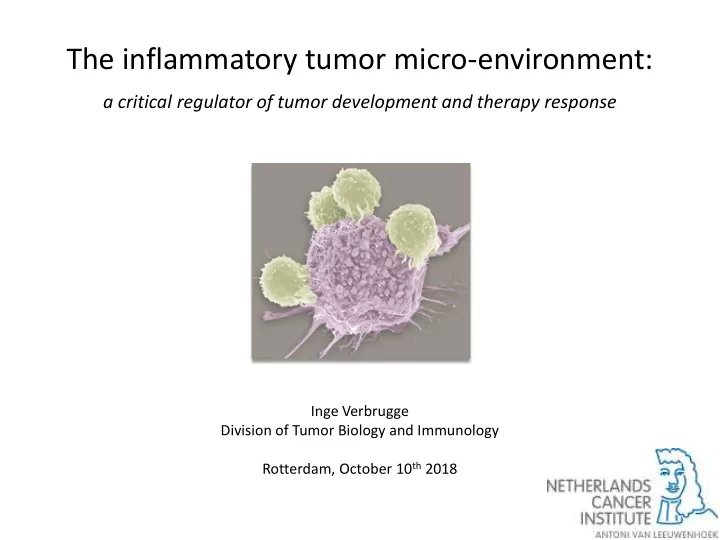

The inflammatory tumor micro-environment: a critical regulator of tumor development and therapy response Inge Verbrugge Division of Tumor Biology and Immunology Rotterdam, October 10 th 2018
Slide: Seth Coffelt
Part 1: Micro environmental regulation of tumor progression Clinical Associations Slide: Seth Coffelt
1863: First hypothesis linking inflammation and cancer development Rudolf Virchow (1821-1902) German Pathologist
Inflammatory tumor micro-environment in human invasive breast cancer Question: Can inflammation lead to cancer? Do you have examples? Image: Seth Coffelt
Chronic inflammation can promote tumorigenesis Inflammatory Stimulus Malignancy Hepatitis Virus (B and C) Hepatocellular carcinoma Inflammatory Bowel Disease Colorectal Cancer Asbestos Mesothelioma Up to ~15% of cancers, tumor initiation attributed to infection 1 Prostatitis Prostate Cancer Schistosmiasis Bladder Cancer H. plyori -induced gastritis Gastric Cancer Barrett’s metaplasia Oesophageal carcinoma Thyroiditis Papillary thyroid carcinoma 1 de Martel et al., Lancet Oncol 2012;13:607-615
Anti-inflammatory drugs prevent tumor recurrence Kaplan-Meier estimates of the time to a first adenoma in patients with previous colorectal cancer Sandler RS et al. New Engl. J. Med 2003;348:891-899
Influx of innate immune cells correlates with poor prognosis Macrophages in Hodgkin’s lymphoma Macrophages in breast cancer Leek RD et al., Cancer Res 1996;56:4625-4629 Steidl C et al., NEJM 2010;362:875-885
Immune system and cancer: A double-edged sword Pro-tumor Anti-tumor
Impaired immune responses correlate with higher cancer incidence De Visser KE et al., Nat Rev. Cancer 2006;6:24-37
High-density tumor-infiltrating lymphocytes (TILs) correlate with survival advantage in colorectal tumors Galon J et al., Science 2006;313:1960-1964
Part 1: Micro environmental regulation of tumor progression Mechanisms Slide: Seth Coffelt
Major components of the tumor micro-environment 4. Extracellular matrix 1. Tumor vasculature 2. Cancer-associated fibroblasts 3. Inflammatory cells Klemm F and Joyce JJ Trends in Cell Biology 2015; 25:198-213
Slide: Seth Coffelt
Controversial role of the immune system during cancer development Pro-tumor Anti-tumor Cancer Anti-tumor Growth immunity Chronic inflammation Tissue homeostasis
Establishment of inflammatory tumor micro-environment “Wounds that never heal” Quail DF and Joyce JA, Nature Medicine 2013;19:1423-1437
Macrophage infiltration in breast cancer What have experimental studies taught us regarding the role of the immune system during cancer development? What models are available to study this? Slide: Seth Coffelt
Macrophages enhance breast cancer metastasis formation MMTV-Polyoma virus Middle T (PyMT)-transgenic mice • PyMT expression under control of MMTV promoter in mammary epithelium – Spontaneous development of breast cancer – Lin E.Y. et al., J. Exp. Med. 2001;193:727-740
Macrophages contribute to cancer progression Reconstitute CSF1R in Macrophage-deficient mice Tumor grade Lin E.Y. et al., J. Exp. Med. 2001;193:727-740
Macrophages contribute to cancer progression at multiple levels (e.g. VEGF) (e.g. CSF-1, VEGF ) (e.g. MMPs) (e.g. EGF) Pollard J. W., Nat Rev Cancer 2004;4:71-78
Conversion of (innate) immune cells during cancer progression Hagerling C. et al., Trends Cell Biol 2015;25:214-220
Part 2: The inflammatory tumor micro-environment and anti-cancer therapy Slide: Seth Coffelt
Anti-cancer therapies targeting the tumor micro-environment Quail DF and Joyce JA, Nature Medicine 2013;19:1423-1437
How the TME can influence response to anti-cancer therapies Klemm F. and Joyce JA, Trends in Cell Biology 2015;25:198-213
T cell infiltration in breast cancer Slide: Seth Coffelt
(Cytotoxic) T cell-mediated tumor cell kill MHC I
The Cancer Immunity Cycle Chen DS and Mellman I, Immunity 2013;39:1-10
Radio-immunotherapy: Concept Blocking coinhibition Radio-immunotherapy promise: α -PD-1, α -CD137 Achieving SYSTEMIC synergism by combining LOCAL radiotherapy with immune-modulation Costimulation Verbrugge I et al., Cancer Res 2012;72:3163-3174 Verbrugge I et al., Radiation Res 2014;82:219-229 Kroon P et al., Cancer Immunol Immunother 2016;65:753-763
Small animal image-guided radiotherapy: mimicking clinical protocols Movies: Jan-Jakob Sonke
Transplantable AT-3 breast cancer model Triple-negative breast cancer cell line • Derived from MMTV-Polyoma virus Middle T (PyMT)-transgenic mouse • Radiotherapy Immunotherapy (
Immunotherapy improves the response to radiotherapy Co-stimulation α -CD137 Control Immunotherapy α -PD-1 Blocking Co-inhibition Radiotherapy Radio-immunotherapy Verbrugge I et al., Cancer Res 2012;72:3163-3174
Radiotherapy can improve immunotherapy responses to out-of-field tumor Irradiated tumor Non-irradiated tumor Deng L et al., J Clin Invest 2014;124:687-695
(Chemo) Radio-immunotherapy to enhance tumor control α -PD-1 α -PD-1, α -CD137 α -CD137
Take home messages Cancer development/progression: • A pre-existing inflammatory environment can promote tumor initiation (‘seed and soil’) • Innate and adaptive immune cells within the TME are diverse, plastic, and in constant dialogue with each other and the developing tumor • Upon loss of tissue homeostasis, tumor cells facilitate formation of an inflammatory TME that can support a growing tumor Response to therapy: • TME can impair and enhance the efficacy of therapeutic interventions through pre- existing and therapy-induced mechanisms • TME may be targeted (‘re-educated’) to halt tumor progression • Targeting the TME in combination with novel or conventional therapies (e.g. chemo-, radiotherapy, immunotherapy) most likely required to eliminate tumors Pro-tumor Cancer Anti-tumor Growth immunity Anti-tumor Chronic inflammation Tissue homeostasis
Acknowledgements Division of Tumor Biology Department of Radiotherapy and Immunology Artem Khmelinskii Paula Kroon Marcel Verheij Elselien Frijlink Andriy Volkov Juntendo University (Tokyo, Japan) Irene vd Haar-Avila Victoria Iglesias-Guimarais Hideo Yagita (antibodies) Seth Coffelt NKI core facilities Karin de Visser Blank group Jules Gadiot Marcel Deken Jannie Borst
Recommend
More recommend